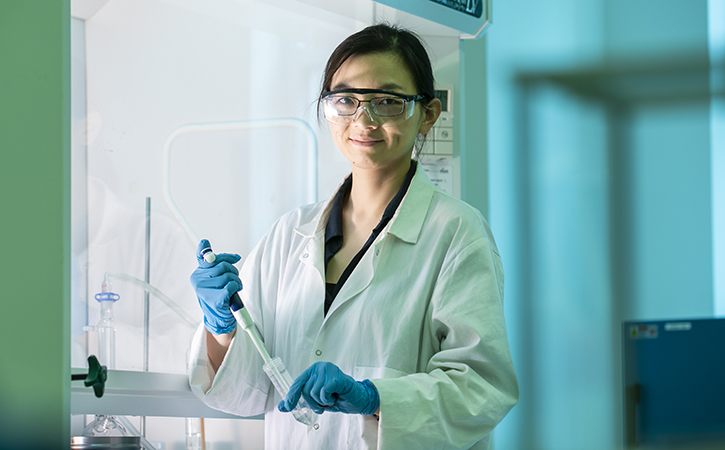
Assistant professor Pei Dong and her lab group are designing the next generation of nanomaterials for the water-energy nexus. Photo by Ron Aira/Creative Services
When it comes to living in a material world, Mason Engineering researcher Pei Dong is making sustainable strides.
As the industrial sector expands, the demand for water and energy will be even greater than it is today, says Dong, an assistant professor in the Department of Mechanical Engineering.
To address this challenge, her research team focuses on designing the next generation of materials and using them for the water-energy nexus, the interdependence of water and energy systems.
“A lot of water is used in all phases of energy production, and at the same time, a lot of energy is used for water treatment,” she says. “We have to figure out a way to minimize the input of required energy for the water desalination, so energy-efficient water treatment technology is one of our current research areas.”
"This work has a direct benefit to society," says Oscar Barton Jr., chair of the Department of Mechanical Engineering. “Her research explores the development of nanomaterials for use in water treatment, renewable energy, and other technologies.”
Dong’s group is looking for sustainable solutions that involve designing and manufacturing advanced materials, including nanomaterials and polymers.
By modifying materials on the atomic level and developing a deep understanding of the kinetics of the process, her team could create new materials with the needed properties for better performance. “With surface modifications, we can dramatically improve the salt-absorption capacity during the water desalination process,” she says.
The team is also working on low-cost semiconducting materials for solar cells, as well as fabricating all-weather integrated renewable energy devices.
“On a cloudy day, most solar cells only generate around 10 percent to 25 percent of their normal power output," Dong says. "We are working on designing and fabricating ultra-lightweight, robust, flexible solar energy systems, which could operate efficiently under various weather conditions.
“As a diverse team including material scientists, mechanical engineers, and electrical engineers, we are dedicating our green efforts in research and education to promote sustainability for a better tomorrow."
“We are dedicating our green efforts in research and education to promote sustainability for a better tomorrow."
— Pei Dong, assistant professor in the Department of Mechanical Engineering
"This work has a direct benefit to society."
— Oscar Barton Jr., chair of the Department of Mechanical Engineering
